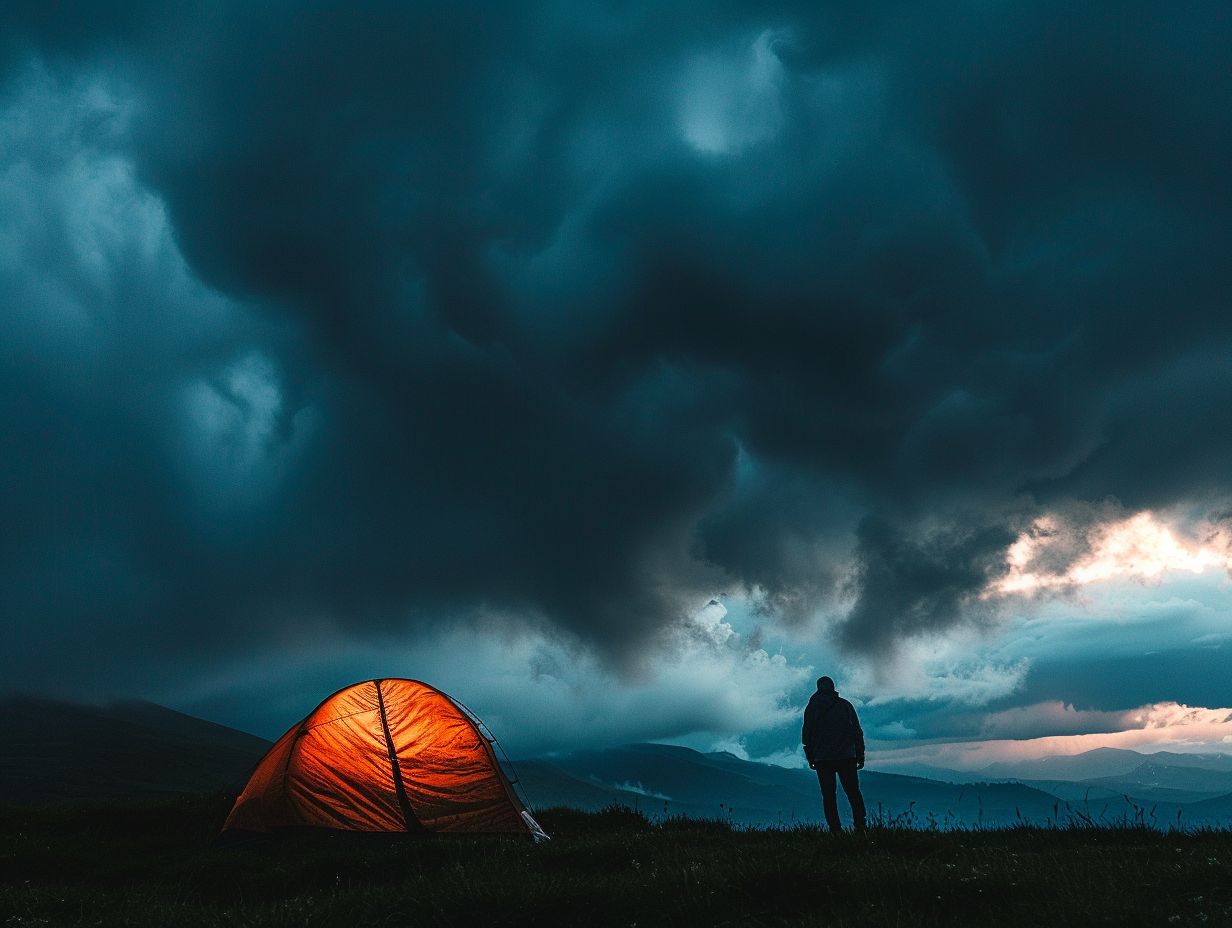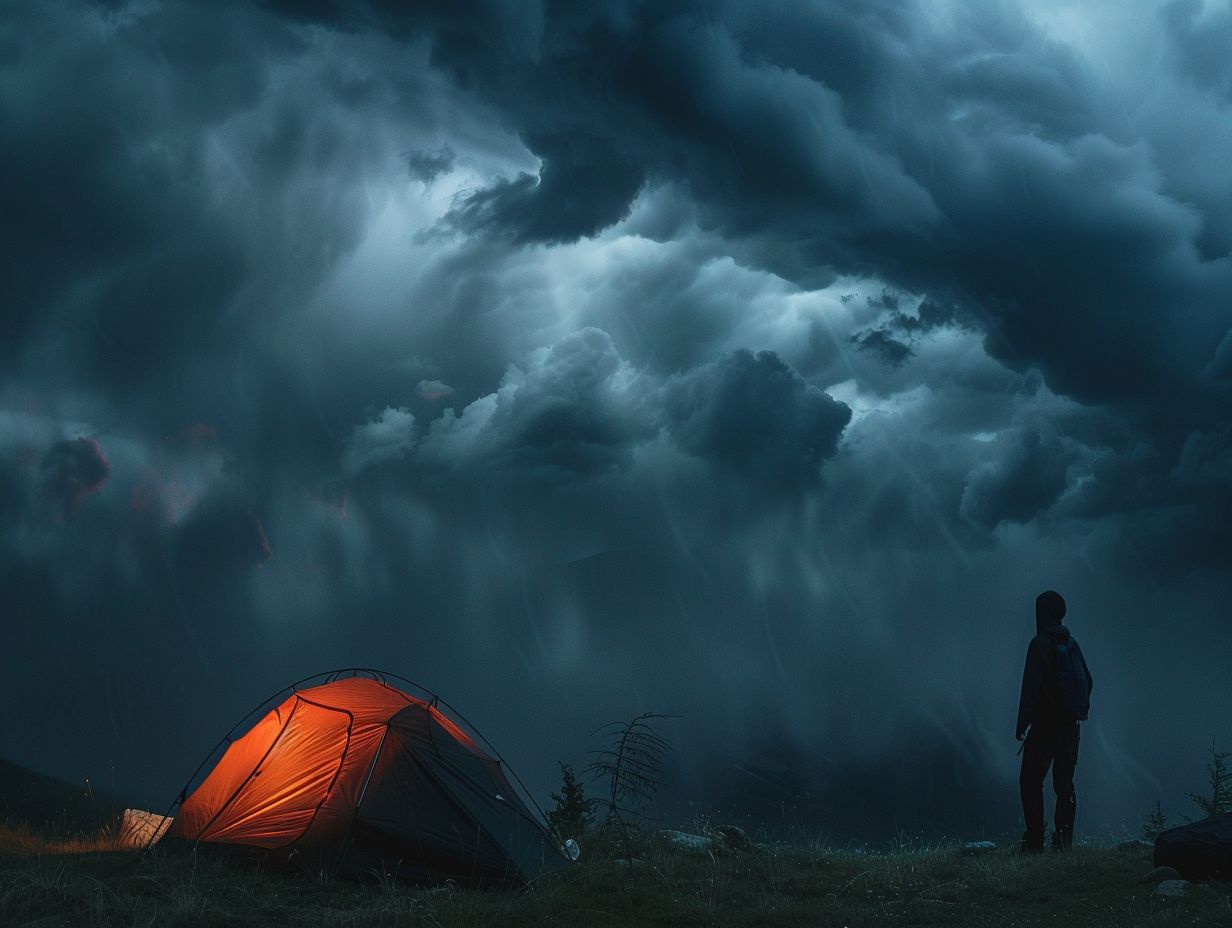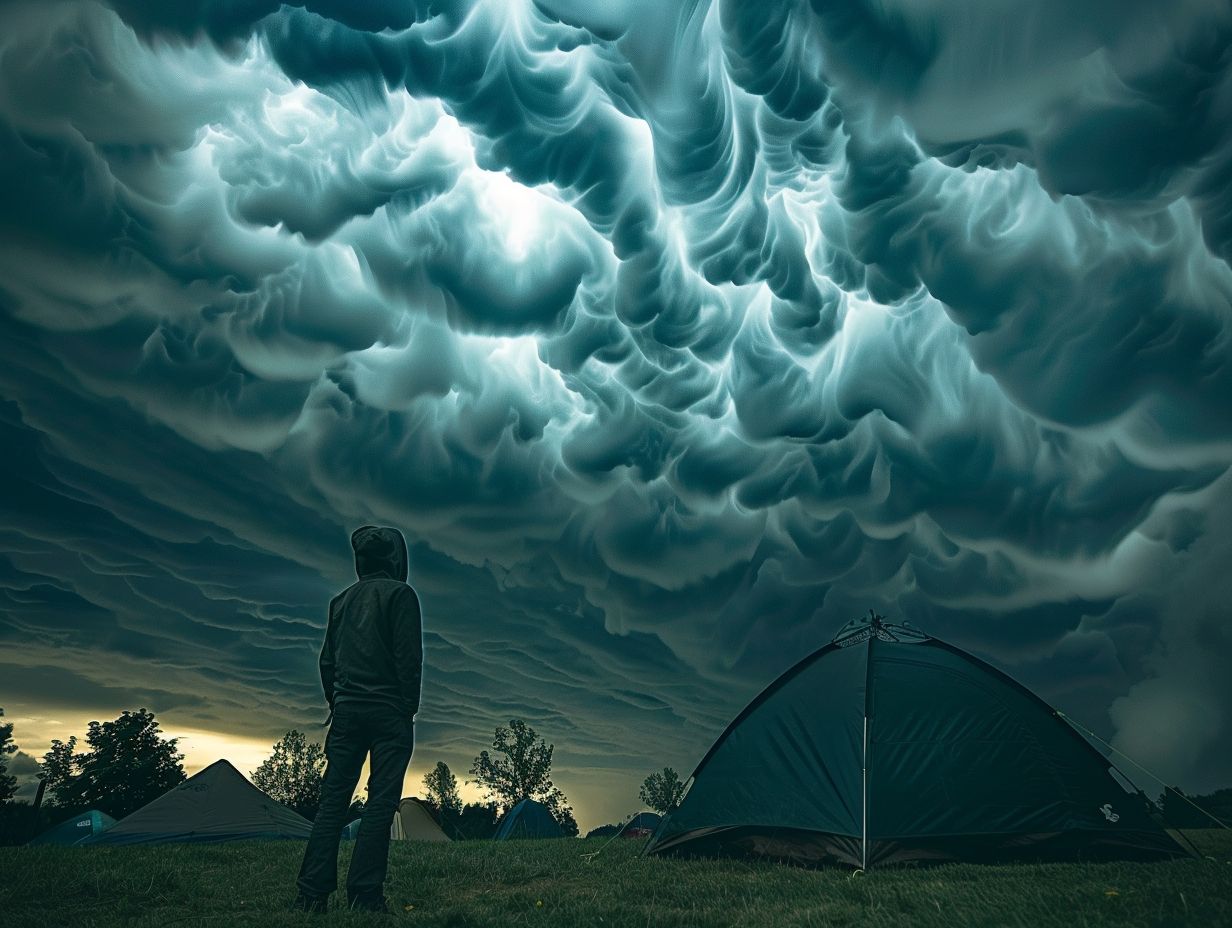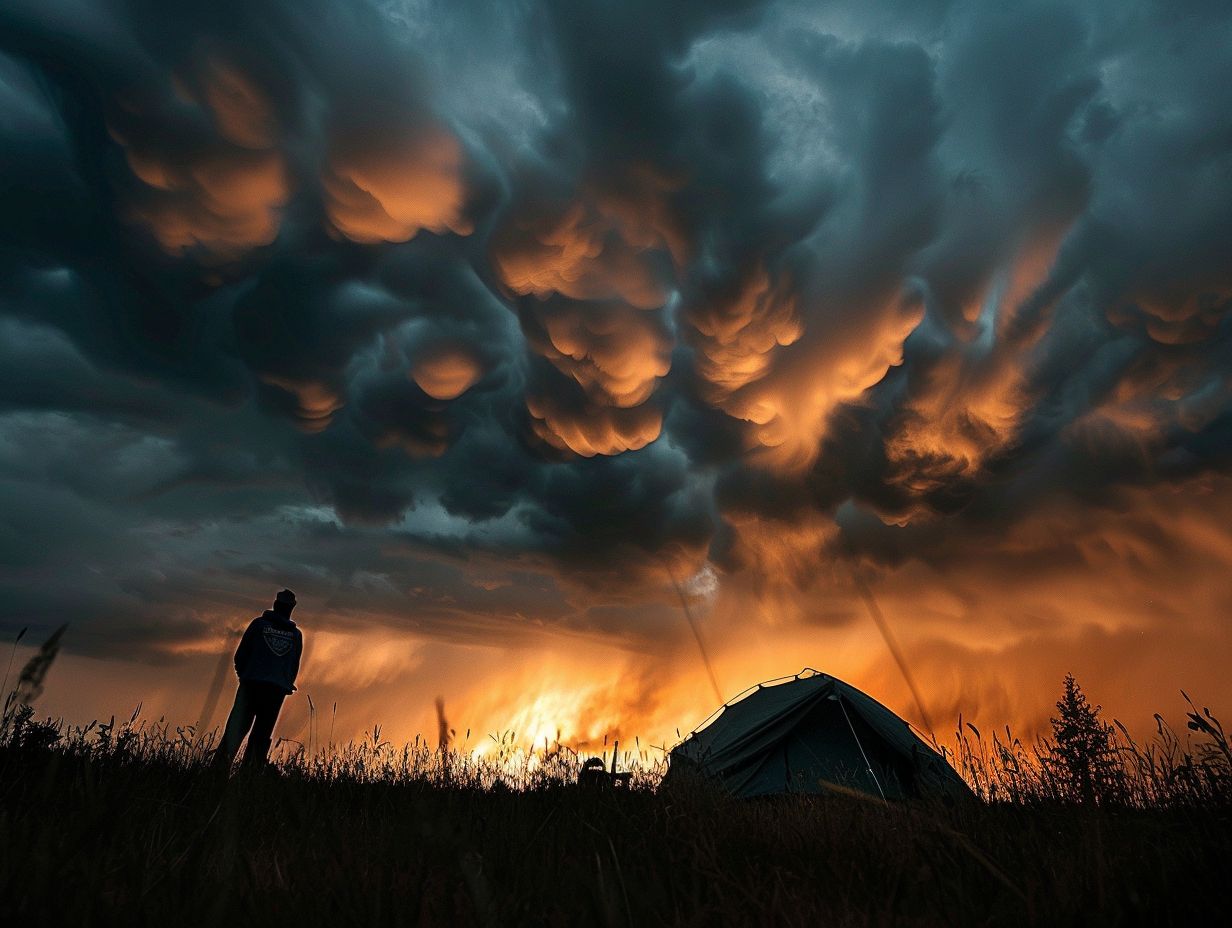If you are an outdoor enthusiast who enjoys camping in nature, understanding the weather and its potential impact on your camping trip is crucial. This article will explore the various factors that can influence weather conditions and the risks associated with being ill-prepared, providing comprehensive information on how to ensure safety during unforeseen weather events.
Learn about the essential gear required for weather emergencies, the importance of creating a weather emergency plan, and valuable tips for safeguarding yourself and your equipment. By staying informed and prepared, you can be ready to face any type of weather that comes your way.
Key Takeaways:

- Always stay informed and understand the potential weather risks when camping.
- Being prepared for unexpected weather is crucial to ensure your safety and the safety of others.
- Having the right gear and a clear emergency plan can make all the difference during severe weather while camping.
Understanding the Weather
Understanding the weather is crucial when planning a camping trip. You need to analyse the temperature, wind conditions, and potential rainfall to ensure a safe and enjoyable outdoor experience. When heading into the great outdoors, you must be prepared for the various ways weather can impact your trip. Extreme temperatures can lead to heatstroke or hypothermia if proper clothing is not packed.
Rain showers can make hiking trails slippery and muddy. Wind conditions can affect the stability of tents and hinder outdoor cooking. Packing layers of clothing suitable for fluctuating temperatures is key, as is staying updated on weather forecasts.
By interpreting these forecasts correctly, you can make informed decisions about whether to proceed with your camping plans or adjust them accordingly.
Factors that Affect Weather
When planning a camping trip, you must be aware of various factors that can influence weather conditions. These factors include wind patterns, temperature fluctuations, chances of rainfall, and the reliability of weather forecasting.
Winds are significant in determining weather conditions as they can introduce different air masses that affect temperature and precipitation. Changes in temperature, whether abrupt or gradual, can have a profound impact on the overall climate, guiding your packing decisions for hot, cold, or mild conditions.
Considering the likelihood of rainfall is crucial for preparing outdoor activities and ensuring you have the appropriate gear. Dependable weather forecasting is essential for making well-informed decisions while camping. It enables you to adjust your plans based on predicted conditions for a safer and more enjoyable experience.
Importance of Being Prepared
Being prepared for unpredictable weather is essential for your camping trip. Ensure you pack the right gear, such as rain shelters, dry bags, and appropriate clothing to keep yourself dry and comfortable.
Anticipating bad weather scenarios can significantly impact your camping experience. By regularly checking weather forecasts and preparing for potential rain or wind, you can enhance your enjoyment of nature without being caught off guard.
It is crucial to pack essential camping gear, including a first aid kit, multi-tool, and headlamp, to ensure you are equipped to handle any situation that may arise. Adding items like dry bags to protect your belongings from moisture will help you maintain a dry and organised campsite, preventing any unwelcome surprises.
Risks of Unpreparedness
Failing to prepare for adverse weather conditions can pose significant risks to you as a camper. Without the necessary gear and shelter, you may be exposed to harsh elements and potential safety hazards.
In cold temperatures, inadequate gear can result in hypothermia or frostbite, while the absence of proper shelter can increase the risk of getting wet and developing conditions like trench foot.
Challenging weather conditions, such as strong winds or heavy rainfall, can make setting up tents and maintaining a secure campsite difficult. Being unprepared for inclement weather not only affects your comfort but also jeopardizes your safety and well-being as a camper, potentially transforming what should be an enjoyable outdoor experience into a dangerous situation.
Essential Gear for Weather Emergencies

Ensuring camper safety during weather emergencies requires having the appropriate kit. This kit should include high-quality rain gear, suitable clothing layers, and a waterproof tent to provide protection against heavy rainfall.
For rain gear, it is essential to have a durable waterproof jacket and trousers that can keep you dry in case of sudden downpours.
Your choice of clothing should include moisture-wicking base layers to manage sweat and maintain warmth. Layering with insulating materials such as fleece and a waterproof outer shell can offer additional protection from the elements.
A waterproof tent not only protects you from getting wet but also contributes to creating a comfortable and dry sleeping environment, ensuring that you can stay warm and well-rested regardless of the weather conditions outside.
Must-Have Items for Any Camping Trip
When preparing for a camping trip, you must have certain items that are essential, regardless of the expected weather conditions. These items include a reliable tent for shelter, tent pegs for stability, and dry bags to protect your belongings from moisture.
A high-quality tent is not only important for providing shelter but also for ensuring a comfortable resting place during your outdoor adventures. Factors such as the material of the tent, its size, and proper ventilation can significantly influence your camping experience.
Tent pegs are crucial for securely anchoring the tent to the ground, preventing it from being blown away by strong winds. Additionally, dry bags are vital for keeping important items such as clothes, electronics, and food dry and safe from water damage, especially when facing unpredictable weather conditions.
Creating a Weather Emergency Plan
Developing a weather emergency plan is crucial for responding effectively to unexpected situations during a camping trip. You need to engage in strategic planning, ensure readiness for emergencies, and make swift decisions under pressure.
Begin by assessing the potential weather risks in the camping area. Once you’ve identified the risks, develop a detailed plan that outlines procedures for sheltering, evacuation routes, emergency contacts, and communication methods. It is important that all campers are familiar with the plan, and conducting regular drills to practice its implementation is recommended.
Prepare a well-equipped emergency kit that includes essentials such as first aid supplies, a torch, extra food and water, and weather-appropriate clothing. Stay updated on the weather forecast and be ready to adjust your plan if conditions change rapidly.
Steps to Take in Case of Severe Weather
During severe weather conditions on a camping trip, you must take immediate action to ensure your safety. Monitor temperature changes, wind speeds, and be prepared to seek shelter if necessary.
As temperatures drop, it is crucial to watch for sudden decreases, as they may indicate approaching storms or snowfall. Monitoring the wind’s direction and speed can help determine the severity of the weather.
Secure loose items and be cautious of falling branches. Taking preemptive actions like moving to lower ground or away from tall trees can reduce the risk of encountering dangerous conditions. Stay informed by checking weather forecasts and have an emergency plan in place.
Staying Safe During Unexpected Weather
Maintaining safety during unexpected weather challenges is paramount for campers like you. This involves seeking proper shelter, staying dry to prevent hypothermia, and being vigilant against strong winds and storms.
To enhance your safety, you should always carry waterproof gear such as raincoats, ponchos, and waterproof footwear. It’s crucial to set up camp in an area protected from potential flooding or falling debris. Keeping tabs on weather forecasts and having a communication plan if severe weather strikes are essential precautions.
Securing all equipment and tents properly can prevent damage from high winds. By staying prepared and proactive, you can enjoy your outdoor adventures while minimising risks associated with sudden weather changes.
Tips for Protecting Yourself and Your Gear

Protecting yourself and your gear in inclement camping weather is essential for a successful trip. To ensure personal safety and safeguard your camping gear during challenging weather conditions, consider the following tips.
- One of the most important recommendations is to invest in high-quality waterproofing products for your gear, such as waterproof covers for rucksacks, tents, and sleeping bags. Regularly inspect and maintain your gear to verify that zips, seams, and fabric remain water-resistant.
- Additionally, it is crucial to pack extra layers of clothing, including waterproof clothing, to stay dry and warm. Taking personal safety precautions such as staying informed about weather forecasts and ensuring you have a well-equipped first aid kit is also vital.
- When setting up camp, secure your belongings by using lockable containers or storing items in your vehicle to prevent damage or theft. These practices will help you protect your gear and yourself during inclement camping weather conditions.
Preparing for Different Types of Weather
Preparing for different types of weather conditions is essential for a well-rounded camping experience. Whether you are facing cold, hot, or unexpected weather changes, you must adapt your gear and strategies accordingly.
In rainy conditions, it is crucial for you to have a reliable waterproof tent and rainfly to ensure you stay dry and comfortable. Additionally, packing extra tarps or a waterproof groundsheet can help prevent water from seeping into your tent.
To combat cold weather, it is essential for you to have insulating layers, such as thermal clothing and sleeping bags rated for lower temperatures. Managing your gear for varying temperature ranges involves layering clothing for easy adjustment and having both lightweight and heavy-duty options available for different conditions.
Tailoring Your Plan for Different Situations
Tailoring your camping plan to suit different weather situations is crucial for a successful outdoor adventure. By considering weather forecasts, temperature variations, and ensuring warmth in changing conditions, you can guarantee a comfortable experience.
When preparing for your camping trip, it is essential to pack versatile clothing layers that can be easily added or removed depending on temperature fluctuations. Investing in a high-quality sleeping bag rated for the expected nighttime lows can significantly impact your comfort during cool evenings.
In the case of rainy forecasts, having waterproof gear and setting up proper shelter can help maintain your comfort and dryness. Flexibility with your itinerary and having backup activities ready in case of unexpected weather changes can also enhance your overall camping experience.
Frequently Asked Questions
What should I do if unexpected severe weather is forecasted while camping?
If you are aware of potential severe weather, it is important to be prepared. First, check weather updates regularly and have a plan in place. Consider packing a first aid kit, non-perishable food, and extra supplies in case of an emergency. It is also wise to have a designated shelter area in case of lightning or high winds.
How can I stay safe during a sudden thunderstorm?

If a thunderstorm occurs suddenly while you are camping, it is important to seek shelter immediately. Avoid tall, isolated objects and do not stay near water. Find a low-lying area and crouch down with your feet together. Do not lie down on the ground. Wait at least 30 minutes after the last thunder before leaving your shelter.
What should I do if there is a flash flood while camping?
If there is a flash flood, do not attempt to cross rivers or streams. Move to higher ground and avoid areas that are prone to flooding. If you are in a tent, move to higher ground if possible, or seek shelter in a nearby sturdy building. Never drive or walk through floodwaters as they can be deeper and more dangerous than they appear.
How can I prepare for unexpected temperature changes while camping?
Weather can change quickly while camping, so it is important to be prepared for temperature changes. Pack layers of clothing that you can easily add or remove as needed. Bring a warm sleeping bag and a waterproof tent in case of rain or cold temperatures. Always check the weather forecast before your trip.
What should I do if there is a sudden heatwave while camping?
If you are confronted with a heatwave while camping, it is important to stay hydrated. Drink plenty of water and avoid strenuous activities during the hottest part of the day. Seek shade and use sunscreen to prevent sunburn. If possible, set up your tent in a shaded area and consider using a fan to cool off.
How can I protect my campsite during unexpected strong winds?
If you are camping in an area prone to strong winds, it is important to secure your campsite. Use tent stakes and guylines to anchor your tent and any other equipment. Avoid setting up your tent near trees or other objects that could fall or break in strong winds. Pack extra tarps to add an extra layer of protection to your campsite if necessary.



